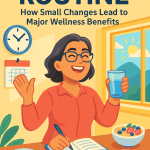This article is for informational purposes only and should not be considered medical advice. Always consult a healthcare professional for personalized guidance.
Understanding Menopause
Menopause marks a significant transition in a woman’s life, typically occurring between the ages of 45 and 55. This natural biological process signifies the end of menstrual cycles and fertility, resulting from a decline in hormone production, particularly estrogen and progesterone. While menopause is a normal phase, it can bring about various symptoms that may affect daily life. Understanding these symptoms is the first step toward effective management.
Pathophysiology of Menopause
During menopause, the ovaries gradually produce less estrogen and progesterone, leading to the cessation of ovulation and menstruation. This hormonal shift can disrupt various bodily systems. For instance, estrogen is crucial for maintaining bone density; thus, its decline can increase the risk of osteoporosis. Additionally, the interplay between hormones and neurotransmitters can affect mood regulation, leading to symptoms of anxiety and depression. As estrogen levels drop, the body may also experience changes in lipid metabolism, which can contribute to cardiovascular risks. Understanding these mechanisms can help women anticipate and manage their symptoms more effectively.
Common Menopause Symptoms
Women experience a range of symptoms during menopause, which can vary in intensity and duration. Some of the most common symptoms include:
- Hot Flashes: Sudden feelings of warmth, often accompanied by sweating and flushing. These can occur at any time and may last for several minutes.
- Night Sweats: Hot flashes that occur during sleep, disrupting rest and leading to fatigue.
- Sleep Disturbances: Difficulty falling asleep or staying asleep due to hormonal changes, often exacerbated by night sweats.
- Mood Changes: Increased irritability, anxiety, or depression, which can be linked to hormonal fluctuations and life stressors.
- Vaginal Dryness: Decreased lubrication can lead to discomfort during intercourse and may affect sexual health.
- Weight Gain: Many women notice changes in body composition during menopause, often due to metabolic changes and decreased physical activity.
Managing Menopause Symptoms
Fortunately, there are numerous strategies available to help manage menopause symptoms effectively. These can range from lifestyle changes to medical treatments.
Lifestyle Modifications
Making certain lifestyle changes can significantly alleviate menopause symptoms. Consider the following:
- Diet: Focus on a balanced diet rich in fruits, vegetables, whole grains, and lean proteins. Foods high in phytoestrogens, like soy products, can help balance hormones. For example, incorporating tofu or edamame into meals can provide relief from hot flashes. Additionally, omega-3 fatty acids found in fish may improve mood and cognitive function. Women should also ensure adequate calcium and vitamin D intake to support bone health, particularly as the risk of osteoporosis increases.
- Exercise: Regular physical activity can help manage weight, improve mood, and promote better sleep. Aim for at least 150 minutes of moderate aerobic activity each week, such as brisk walking or swimming. Strength training exercises can also help maintain bone density. Consider activities like yoga or Pilates, which can enhance flexibility and reduce stress.
- Stress Management: Techniques such as yoga, meditation, or deep-breathing exercises can help manage stress and emotional fluctuations. Finding a local class or using online resources can make this easier. Mindfulness practices can enhance emotional resilience and improve overall well-being.
Medical Treatments
If lifestyle changes alone are insufficient, various medical treatments can be considered:
- Hormone Replacement Therapy (HRT): HRT can effectively relieve many menopause symptoms by replenishing estrogen levels. However, it’s important to discuss the risks and benefits with your healthcare provider, as HRT may not be suitable for everyone. For instance, women with a history of certain cancers or blood clots may need alternative treatments. It’s crucial to have regular follow-ups to monitor any potential side effects.
- Non-Hormonal Medications: Certain antidepressants, anti-seizure medications, and blood pressure medications have been found to help with hot flashes and mood changes. For example, the antidepressant venlafaxine has shown effectiveness in reducing hot flashes. Gabapentin and clonidine are also options that some women find beneficial.
- Vaginal Estrogen: For vaginal dryness, localized estrogen treatments, such as creams or rings, can provide targeted relief without systemic effects. This approach can improve sexual health and comfort during intimacy.
Natural Remedies
Many women prefer to explore natural remedies for symptom relief. While the evidence may vary, some options include:
- Herbal Supplements: Black cohosh and red clover are popular herbal remedies believed to alleviate hot flashes. However, consult with a healthcare provider before starting any supplements to avoid interactions with other medications. Other options, such as evening primrose oil, may also be considered, but their efficacy can vary among individuals.
- Acupuncture: Some studies suggest acupuncture may help reduce hot flashes and improve overall well-being during menopause. This technique may also aid in stress reduction and relaxation, providing a holistic approach to symptom management.
- Mind-Body Practices: Techniques such as mindfulness and tai chi can enhance emotional health and physical relaxation. Engaging in these practices can foster a sense of community and support, which is vital during this transitional phase.
Patient Story: Finding Balance
Consider the story of Sarah, a 52-year-old woman who began experiencing severe hot flashes and mood swings. After discussing her symptoms with her doctor, she opted for a combination of lifestyle changes and HRT. By incorporating regular exercise and a balanced diet, along with her prescribed treatment, Sarah successfully managed her symptoms and regained her sense of well-being. She also found solace in a local support group, where she shared experiences and strategies with other women navigating similar challenges. Sarah’s journey illustrates the importance of personalized care and community support in managing menopause.
Myths vs. Facts about Menopause
Myth 1: Menopause Happens Overnight
Fact: Menopause is a gradual process, often beginning with perimenopause, which can last several years before menstruation ceases. Understanding this timeline can help women prepare for the changes ahead.
Myth 2: All Women Experience Severe Symptoms
Fact: Symptoms vary widely among women; some may have mild symptoms, while others may experience more severe effects. Personal health history and lifestyle choices can influence symptom severity, making individualized approaches essential.
Myth 3: Menopause Means the End of Sexual Activity
Fact: While some women may experience vaginal dryness, many continue to have fulfilling sexual relationships with appropriate treatment and communication. Open dialogue with partners can enhance intimacy and connection.
Frequently Asked Questions
What are the first signs of menopause?
The first signs often include irregular periods, hot flashes, and sleep disturbances. Women may also notice changes in mood and vaginal dryness. Recognizing these signs early can facilitate proactive management.
How long do menopause symptoms last?
Menopause symptoms can last anywhere from a few months to several years. On average, many women experience symptoms for about four years after their last period, though some may experience them for a decade or more.
Can I still get pregnant during perimenopause?
Yes, it is still possible to become pregnant during perimenopause, as ovulation can occur sporadically. If pregnancy is not desired, consider contraception options. Discussing family planning with a healthcare provider can provide clarity.
Are there any foods to avoid during menopause?
Limiting caffeine, alcohol, and spicy foods may help reduce hot flashes and improve sleep quality. Focus on hydration and balanced meals instead. Incorporating foods rich in calcium and vitamin D can support bone health.
Is hormone therapy safe?
HRT can be safe for many women but carries potential risks. Discuss your individual health history with your healthcare provider to make an informed decision. Regular follow-ups can help monitor any side effects.
Final Thoughts
Managing menopause symptoms is a personal journey that requires understanding, support, and often a combination of strategies. Whether through lifestyle changes, medical treatments, or natural remedies, there are effective ways to navigate this transition. Remember, you are not alone, and seeking support from healthcare professionals, friends, and family can make a significant difference. Embrace this new chapter with confidence and awareness, knowing that numerous resources are available to help you thrive during menopause.
Key Takeaways
- Menopause typically occurs between ages 45 and 55, marking the end of menstrual cycles.
- Common symptoms include hot flashes, night sweats, mood changes, and vaginal dryness.
- Lifestyle changes such as diet and exercise can significantly alleviate symptoms.
- Hormone Replacement Therapy (HRT) is an effective treatment but should be discussed with a healthcare provider.
- Natural remedies like herbal supplements and acupuncture may provide relief for some women.
- Understanding myths vs. facts about menopause can empower women during this transition.
References
- PubMed: Menopause and its management
- CDC: Menopause
- NHS: Menopause Symptoms and Treatments
- WHO: Women's Health and Menopause
- UpToDate: Management of Menopause
- Mayo Clinic: Menopause Overview
- American College of Obstetricians and Gynecologists: Menopause FAQ
- National Institute on Aging: What is Menopause?
- Cleveland Clinic: Menopause Treatment Options
- Harvard Health: Natural Remedies for Menopause








Post a comment